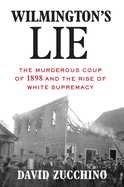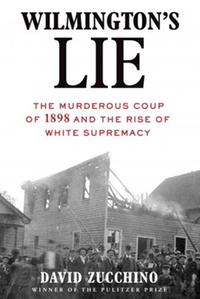
 Wilmington's Lie: The Murderous Coup of 1898 and the Rise of White Supremacy is a remarkable account of a distinctive historical moment: the only violent overthrow of an elected government in U.S. history. Pulitzer Prize-winning journalist David Zucchino, author of Thunder Run and Myth of the Welfare Queen, pierces layers of myth and invented history, built up by the successful perpetrators of the coup and their white supremacist allies, to depict the terrifying violence that set the stage for more than half a century of Jim Crow rule.
Wilmington's Lie: The Murderous Coup of 1898 and the Rise of White Supremacy is a remarkable account of a distinctive historical moment: the only violent overthrow of an elected government in U.S. history. Pulitzer Prize-winning journalist David Zucchino, author of Thunder Run and Myth of the Welfare Queen, pierces layers of myth and invented history, built up by the successful perpetrators of the coup and their white supremacist allies, to depict the terrifying violence that set the stage for more than half a century of Jim Crow rule.
At the end of the 19th century, Wilmington, N.C., was a thriving mixed-race community with numerous black officials, including police officers. One of the wealthiest men in the city was a black man, and a sizable black middle class had developed. North Carolina was ruled by the proponents of a powerful compromise known as Fusion politics, which allied the Republican and Populist parties against Democrats. Republicans actively campaigned for black votes, and rewarded those votes with political appointments. It was a far cry, in other words, from Southern states where white Democrats had already "redeemed" state and local governments.
The violence in Wilmington has sometimes been portrayed as a spontaneous outburst of racial animus. Wilmington's Lie definitively shows that the coup and the violence used to enforce it had been thoroughly planned by white supremacists. Zucchino describes how racial hatred was used as a tool by practical-minded Democrats who sought a way back into power. Newspapers pushed white supremacist talking points, railing against what they called "Negro domination" and the mythical specter of rampaging black rapists. Wilmington's Lie demonstrates that an appetite for violence was stoked and then carefully directed to align with Democratic electoral objectives. Voter suppression techniques, intimidation and ballot-stuffing ensured Democratic victory in the 1898 election, but that wasn't enough for the white supremacists: Republicans still in office, including the mayor, were thrown out.
Zucchino's account of the terror and violence that accompanied the Wilmington coup unfolds in horrifying detail. Military units summoned to quell a supposed black riot joined in the killing, adding to whites' overwhelming advantage by deploying fearsome rapid-fire guns. More than 60 black men were killed. Again, Zucchino emphasizes how what might seem like random violence in fact served practical political aims. The terror and a subsequent banishment campaign denuded the black middle class and inspired a mass exodus of black Wilmingtonians. Zucchino writes: "They had turned a black-majority city into a white citadel."
Some of Zucchino's most provocative reflections come in the epilogue, where he draws comparisons between the voter suppression methods of the 19th century and the recent efforts of North Carolina's Republican politicians to limit black, and therefore Democratic, voting. He also writes about the disputed memories of the coup, still a contentious issue after more than a century. Zucchino never needs to stretch to find connections between the 1898 coup and the present day. The trauma--as well as political and economic consequences--still linger. --Hank Stephenson, manuscript reader, The Sun magazine
Shelf Talker: Wilmington's Lie reconstructs the only violent overthrow of an elected government in U.S. history, tying the white supremacist bloodshed to political goals that are still relevant today.

